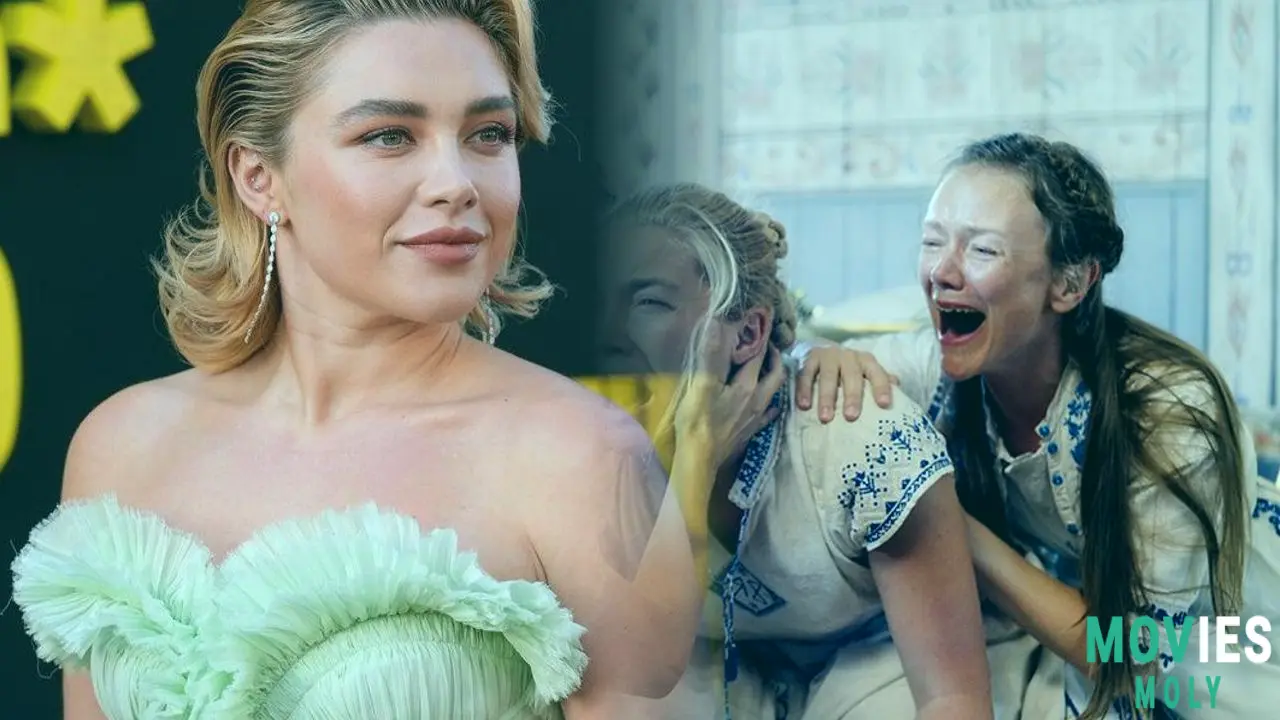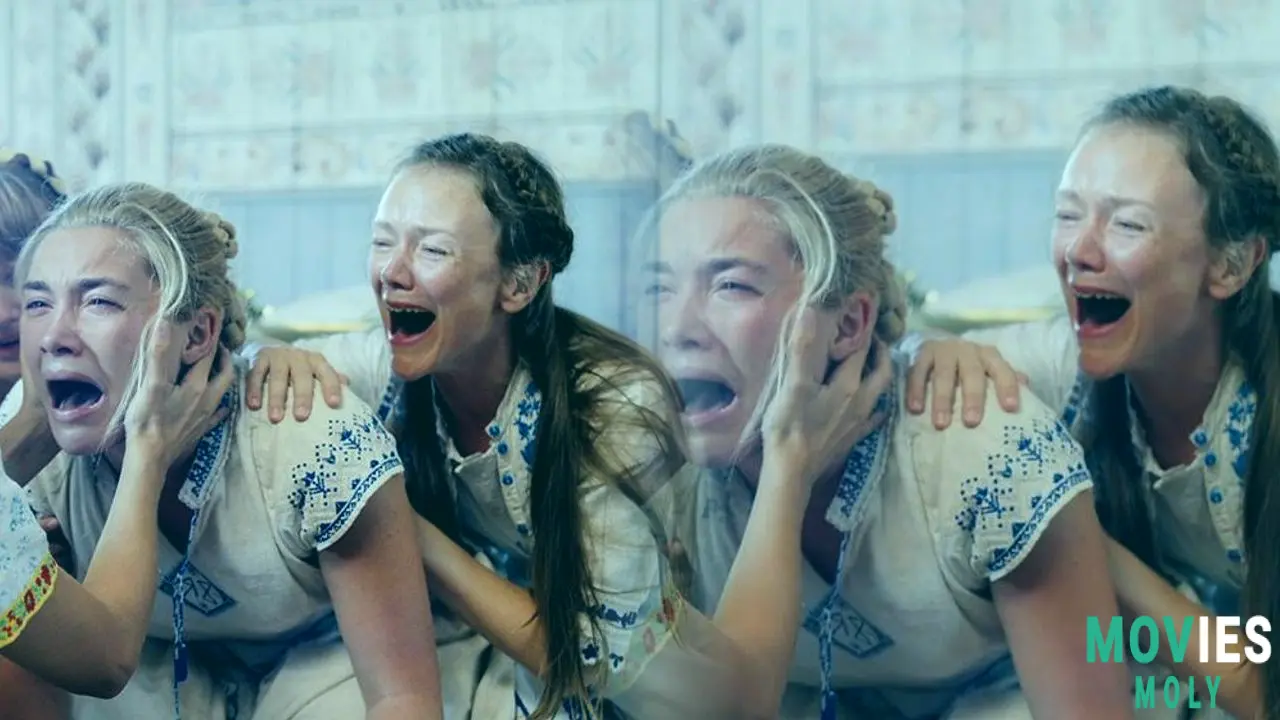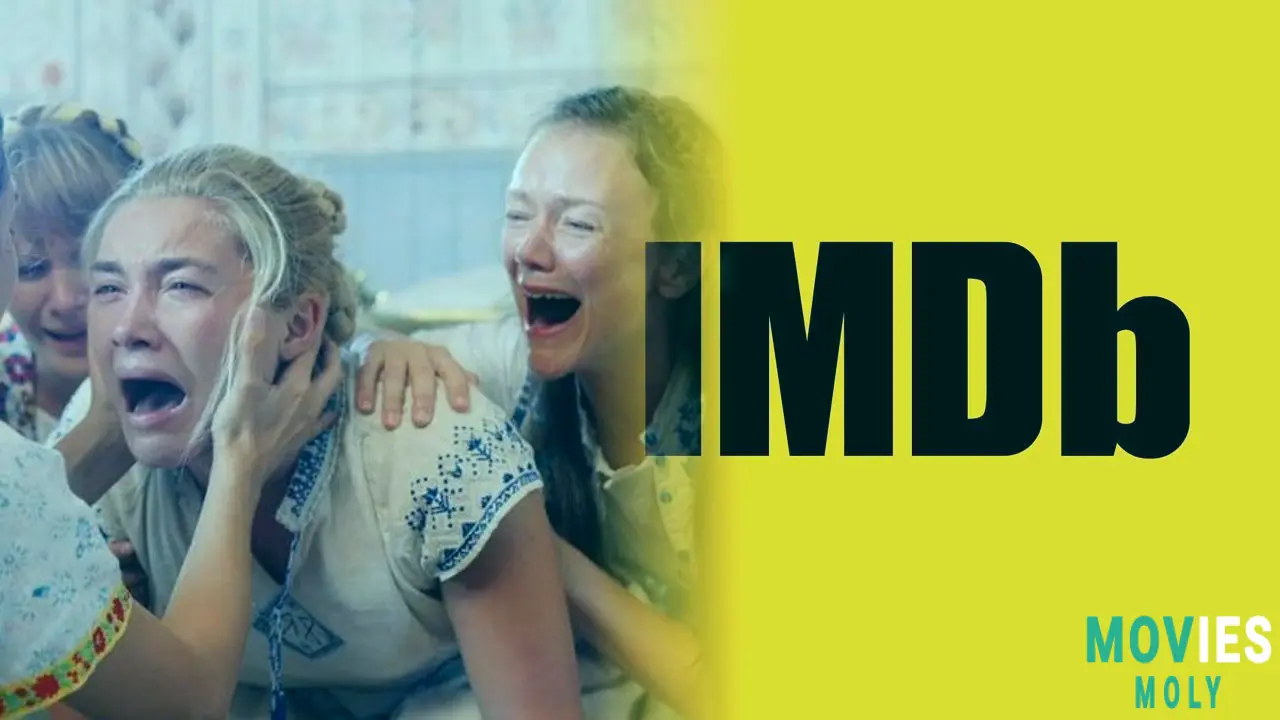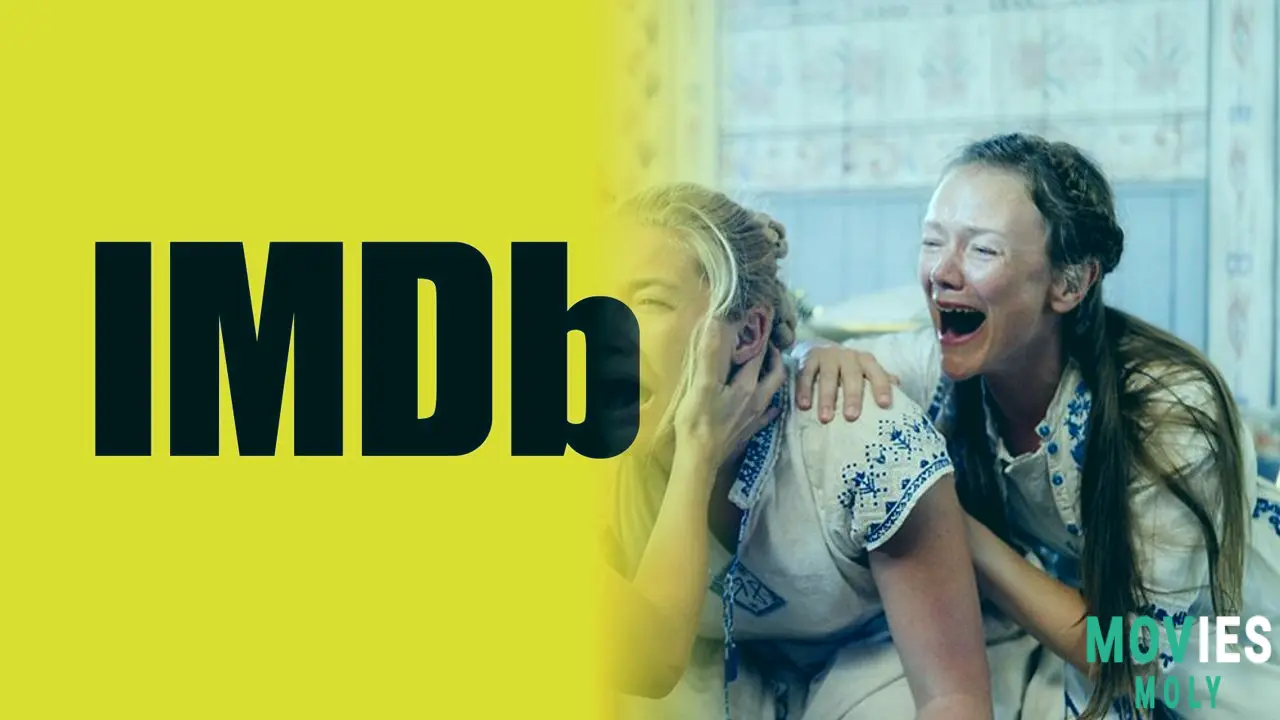Florence Pugh opens up about the intense emotional toll of portraying Dani in the 2019 folk horror film, sharing how the experience plunged her into a prolonged period of sadness and led to a re-evaluation of her acting methods.
TL;DR: The Quick Take
- Florence Pugh experienced a difficult six-month period of depression following the intense filming of Midsommar.
- She describes intentionally "abusing" and "manipulating" her own emotions to achieve Dani's visceral grief on screen.
- Pugh is now committed to not repeating such a mentally taxing process, prioritizing her mental well-being over extreme method acting.
Imagine the raw, guttural cries of Dani in Midsommar, a character utterly consumed by an unimaginable family tragedy and then thrown into a nightmarish commune. For actress Florence Pugh, bringing that profound despair to life wasn't just a performance; it was an emotional odyssey that deeply impacted her for months after the cameras stopped rolling. In a candid interview on The Louis Theroux Podcast, Pugh recently peeled back the curtain on the mental anguish she endured, revealing that the role led to six months of depression, an experience she vows never to repeat.
Pugh's portrayal of Dani, a grief-stricken American woman who experiences a psychological breakdown, was lauded by critics and audiences alike. However, the internal cost of achieving such an authentic performance was immense. Pugh shared that she had "never, ever been through anything close to that" in her own life, nor had she witnessed "that level of grief or mental health in the way that was being asked of me on the page."
Deep Dive into the Actor's Process: Crafting Dani's Devastating GriefTo embody Dani's constant state of anxiety and impending panic attacks, Pugh employed a deeply personal and physically demanding method. She meticulously built up the character's trauma within herself throughout the shoot. "At the beginning, I just imagined hearing the news that one of my siblings had died," Pugh explained. As filming progressed, the visualization intensified: "towards the middle of the shoot, it was like, oh no, I actually needed to imagine the coffins. And then towards the end of the shoot, I actually was going to my whole family’s funeral."
This deliberate emotional manipulation was, in her words, a form of "abuse" to herself. She recounts needing to "sound pained," not just cry, pushing her limits far beyond what she had previously experienced. "I would just basically put myself through hell," she confessed, highlighting the extreme measures she took to deliver such a raw and believable performance.
“My brain was obviously feeling sympathy for myself, because I’d abused myself and really manipulated my own emotions to get a performance.” — Florence Pugh, The Louis Theroux PodcastThe immediate aftermath of filming offered no respite. With just three days separating the intense Budapest shoot of Midsommar from her next project, Greta Gerwig’s Little Women in Boston, Pugh had little time to decompress. On the plane leaving Hungary, she broke down weeping. It was a powerful, unexpected surge of emotion, as she felt she had literally "left Dani there" in the field where the film's climax was shot, still crying, without her.
The Lingering Shadow of an Intense Role: Six Months of Post-Film Depression

The emotional toll wasn't just momentary; it had a significant "knock-on effect." Pugh initially "shelved all of that" when diving into the vastly different, lighter tone of Little Women, which she described as "such a fun experience." It wasn't until she returned home for Christmas that the hidden emotional baggage surfaced, leading to a period of deep sadness.
"I think [Midsommar] made me sad for like six months after and I didn’t know why I was depressed," she revealed. This delayed realization underscored the profound impact the role had on her mental health. It became a pivotal moment for her, prompting a clear decision: "I didn’t deal with it and I probably shouldn’t do that again." Source: [Variety, "Florence Pugh Says ‘Midsommar’ Led to Six Months of Depression Because ‘I’d Abused Myself’", November 11, 2025].
Understanding the Complex Relationship Between Acting and Personal Well-being
The discussion around actor well-being, especially in deeply traumatic roles, is becoming increasingly vital in Hollywood. Pugh's experience highlights the fine line between fully committing to a character and safeguarding one's own mental health. While her dedication resulted in a widely acclaimed performance, it came at a significant personal cost, forcing her to confront the boundaries of her craft.
For example, imagine an actor tasked with portraying a character enduring extreme isolation and starvation. To achieve what they believe is an authentic performance, they might drastically restrict their diet and withdraw from social interaction for months. While the on-screen result might be compelling, the actor could face severe health issues, both physical and psychological, long after the film wraps. Pugh’s situation, though emotional rather than physical, draws a clear parallel to this kind of immersive, potentially damaging method acting.
Ari Aster's Unique Directorial Style and Critical Acclaim for 'Midsommar'

Despite the personal struggle, Pugh has consistently praised director Ari Aster, known for his distinctive approach to psychological horror films like Hereditary. She described him as "peculiar in a mad genius kind of way" and even "a stand-up comedian at heart." Source: [The New York Times, Interview with Florence Pugh, 2023, cited in Rolling Stone]. Aster even conducted "therapy sessions" with Pugh and her co-star Jack Reynor (who played Christian) while they were in character, further immersing them in their roles. Pugh found this "stuff quite hard," which is understandable given the already intense nature of the material.
Critics widely recognized the brilliance of both Aster’s vision and Pugh’s performance. Peter Travers, writing for Rolling Stone, called Aster "a bold new voice in psychological horror, the kind that messes ruthlessly with your head." He specifically touted Pugh's work, stating she "works wonders in showing us a character who grows in confidence and toxic strength as the film progresses toward Dani’s validating vengeance." Source: [Rolling Stone, "Midsommar Review," cited in Rolling Stone, "Florence Pugh Plunged Her Into Months of Depression", November 12, 2025]. Many believe her performance was Oscar-worthy.
The Trade-off: Acclaimed Performance at a High Personal Cost
This situation presents a clear tradeoff: the pursuit of artistic excellence often demands profound personal sacrifice. Pugh's ability to tap into such raw emotion undoubtedly contributed to the film's success and her critical accolades. The intensity she describes—imagining the coffins and funerals of her own family—was precisely what made Dani’s grief so horrifyingly real and relatable to viewers.
However, this level of immersion, while effective, comes with significant risks. Pugh explicitly clarified that any "abuse" she suffered was "strictly self-inflicted and had nothing to do with Aster." This is an important distinction; it highlights an actor's personal responsibility and agency in their craft, even within a demanding directorial environment. The director created the space, but Pugh pushed herself to the extremes.
The film, released in 2019, featured a talented ensemble cast including Jack Reynor, Will Poulter, William Jackson Harper, and Archie Madekwe. Pugh's performance, particularly in its raw vulnerability and eventual catharsis, remains a standout element of the movie, solidifying her reputation as one of the most compelling actresses of her generation.
Setting New Boundaries: Protecting Mental Health in a Demanding Industry

Florence Pugh's experience with Midsommar has been a catalyst for change in her approach to acting. She firmly stated, "I don’t do that anymore. It really fked me up." Her newfound wisdom involves a conscious effort to protect her mental health. "Protecting myself is something that I’ve had to learn how to do," she noted in a previous podcast interview on Reign With Josh Smith.
This revelation isn't just about one role; it's a testament to the ongoing conversation about mental wellness within the acting profession. Actors are increasingly open about the psychological toll of their work, advocating for practices like intimacy coordinators and more mindful production schedules. Pugh’s candidness serves as a powerful reminder that while the illusion of seamless performance is captivating, the human behind the character endures real experiences.
Practical Takeaways for Film Enthusiasts and Aspiring Actors
- Appreciate the Depth of Performance: Remember that powerful on-screen emotions often stem from intense, sometimes painful, internal work by actors.
- Recognize the Human Cost: Understand that chasing raw authenticity can have significant, long-lasting mental health consequences for performers.
- Support Actor Well-being Initiatives: The industry is evolving to better support actors; awareness from audiences helps drive this change.
- Distinguish Art from Reality: While a performance might feel incredibly real, it's crucial for both actors and audiences to separate the character's trauma from the performer's personal identity.
Frequently Asked Questions About Florence Pugh's 'Midsommar' Experience

When was Midsommar released?
Midsommar premiered in 2019, quickly becoming a significant film in the folk horror genre.
Who directed Midsommar?
The film was directed by Ari Aster, known for his unique and unsettling approach to psychological horror.
What other notable actors starred in Midsommar alongside Florence Pugh?
The film featured a strong cast including Jack Reynor, Will Poulter, William Jackson Harper, and Archie Madekwe.
Where can I listen to Florence Pugh's full interview about Midsommar?
Florence Pugh's detailed account of her experience filming Midsommar is available on The Louis Theroux Podcast, which can be found on Spotify.
Sources
- Madarang, Charisma. "Florence Pugh Says ‘Midsommar’ Plunged Her Into Months of Depression: ‘I’d Abused Myself’." Rolling Stone, November 12, 2025.
- Sharf, Zack. "Florence Pugh Says ‘Midsommar’ Led to Six Months of Depression Because ‘I’d Abused Myself’." Variety - Film News, November 11, 2025.
- Just Jared Staff. "Florence Pugh Says Filming 'Midsommar' Made Her Sad 'For Like 6 Months'." Just Jared, November 11, 2025.
- Associated Press via Huffington Post. "Florence Pugh Says 'Midsommar' Role Left Her 'Sad For Like Six Months' And 'Fed Me Up'." November 11, 2025.
- The New York Times. Interview with Florence Pugh, 2023. (Cited in Rolling Stone article).






